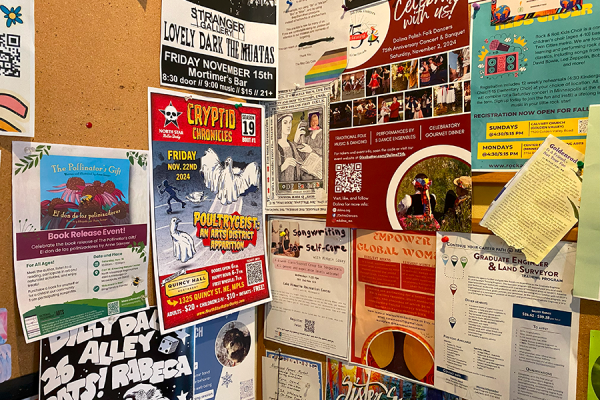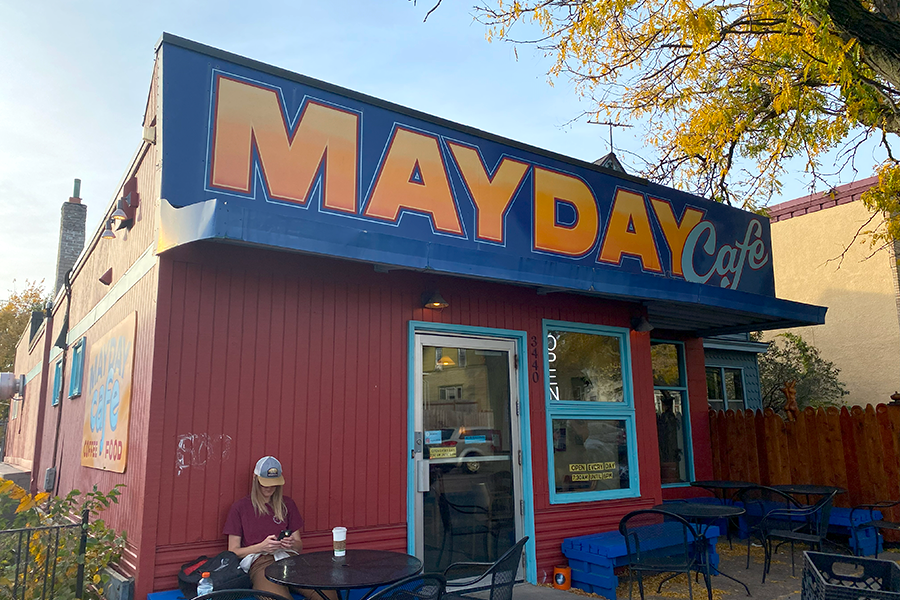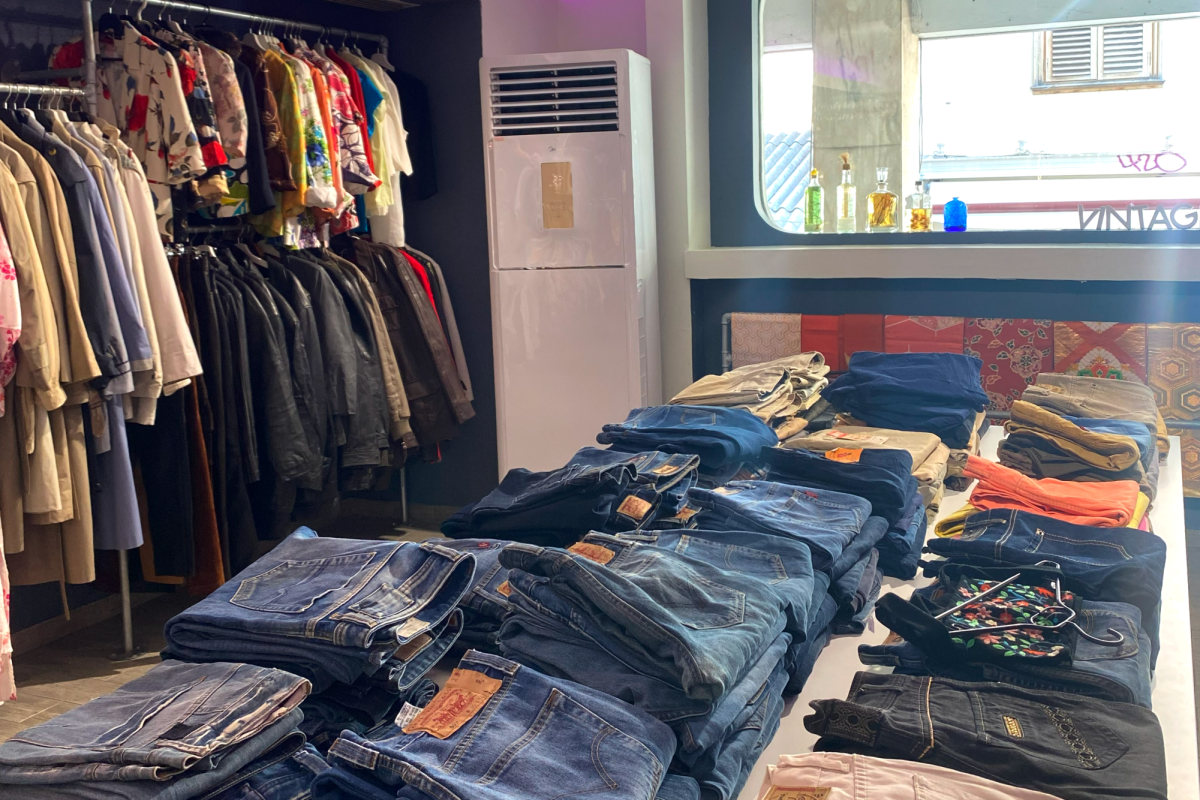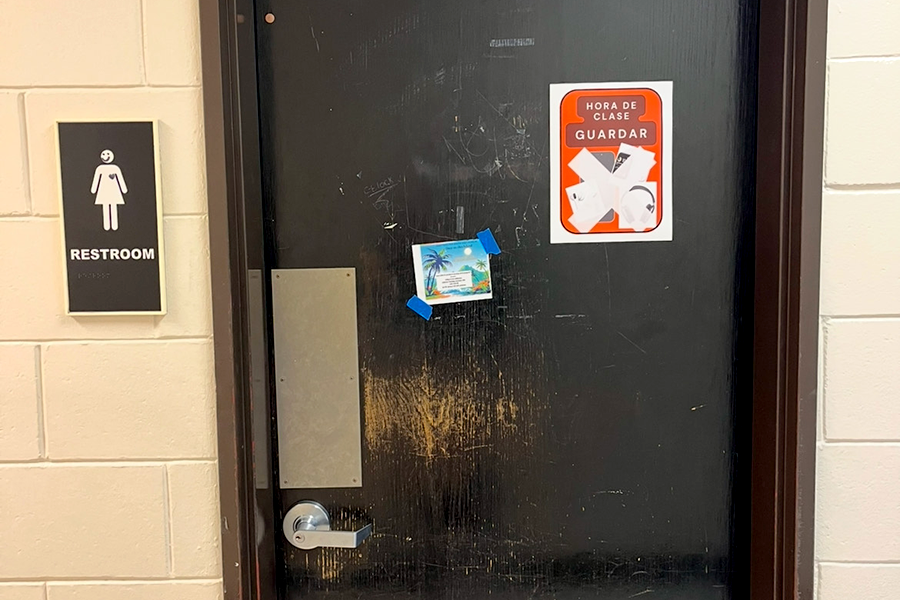When given the opportunity this previous fall, workers at the fan-favorite South Minneapolis May Day Cafe took the initiative to purchase the cafe from longtime owner Andy Lunning and operate the space as a worker cooperative. The decision has been met with an outpour of community love, which can be seen greatly in the long list of people who have chipped in to support the cafe’s donation goal of $250,000. The donation page has been up since this August and is thus far 28% fulfilled. But no decisions come without change, which of course will raise questions. To answer these questions and celebrate the dawn of this new era for May Day, the workers and community members are throwing a block party and parade, in true Powderhorn fashion. The event will go from 1-4 pm on Saturday, October 26th at the lawn of 35th and Elliot Ave and feature live music, community art, and the opportunity for any and all to learn more about May Day’s future. It’s completely free, and welcome to anyone. But to understand this all, why May Day matters, why Powderhorn matters, and most importantly why worker cooperatives matter, we must dig deeper.
May Day Cafe and the Powderhorn Neighborhood rest upon the pillars of community. Community is what makes the world go round, it’s the gasoline in the engine of the universe. We are on this earth to exist with what surrounds us. The plants, the people, the harmony of life. We are here to share, here to trust one another, here to build a sense of love with the things we call our neighbors. These are the same values that a cooperative is built on—trust, respect, care, and love. These are also the values held in the hearts of many across Minneapolis.
The news that May Day would be bought by its workers and operated as a worker co-op likely didn’t surprise many. For years, Minnesota has had a long-winded relationship with both labor and cooperatives. Cooperatives began in Minnesota long ago, although they differed greatly from the co-ops we think of today. Labor Historian Peter Rachleff stated that co-ops began much more tied to the labor movement; skilled machinists and workers in the flour industry were some of the first to cooperate in Minnesota. But as time moved on and the dog-eat-dog greed of capitalism grew, the values of cooperatives were lost. However, many years later, the youth-driven pushback against the Vietnam War would allow these values to resurface. Minneapolis was embracing change in the front of equality, and there was a rising “willingness to experiment with new ways or different ways of organizing life”, said Rachleff. In all this change, the type of co-op Minnesota knows well—the consumer cooperative—became popular. As the food we choose became more and more of a political decision, whether it be due to the meat industry’s contribution to climate change or the DDT and pesticides in produce, food co-ops sprouted up in Minneapolis, including the Powderhorn Food Co-op, which formerly occupied the space we now know as May Day. Longtime Southsider and South art teacher Corbin Doty fondly remembers playing with toys in the play area of the co-op while his parents would volunteer so he could eat healthy food. When he visits May Day now, he can still smell what used to be there, transporting him back to his childhood.
Operating as a worker co-op means May Day workers will be able to own the means of their production, therefore creating less concern regarding profits. The worker-owners will be able to focus more on catering a space for people to gather and unwind. Straying away from traditional management styles that often come with toxic power dynamics, worker co-ops give all workers an equal voice; they are all owners. This greatly differs from that of the consumer co-op, which have seen scrutiny for not committing to co-op values and treating workers unfairly. This shows in the fact that many workers at co-ops around the Twin Cities are unionizing, as recently as last month with the employees at St. Paul’s Mississippi Market. But in worker cooperatives, this shouldn’t be the problem. The first and most important concerns in a worker co-op are that of the worker-owners, who then will make decisions to benefit both the workers and the consumers. Being able to change fluidly and sustainably as a business means that May Day is much more flexible, and can therefore easily shift to manage any problems that may arise.
However, all the familiarity in the world surrounding co-ops couldn’t curb the question of change. To those afraid of their adored May Day changing forever, Mira Klein, worker-owner and leading voice in this new initiative, provided a sense of clarity and relief. “I think people are really attached to the way things are; I think that’s really reasonable. People feel a lot of attachment to their rhythms and routines and connections and their own histories and stories connected to this place. I think that’s what makes it so strong and also what makes the change so scary.” She further explained, “Of course there will be some changes because we can’t do things the same way, but I think we’ve been really clear the whole time that what’s important is to keep the vibe and the core and the essence.” She added, “And that’s what I also love about this place, so that’s not going anywhere. It’s being created by the people who are making it and the people who work here, and that’s really important.”
Nestled near the intersection of 35th Street and Bloomington Avenue, May Day and the surrounding Powderhorn neighborhood have for many years been a place where people can feel welcome. A cafe should be a space for that, right? The best cafes aren’t just a place to get your coffee, they hold a complex hub of communication. There’s a network of orders, conversation, and artistry, all sprouted from the passions of the people who occupy the space. When talking to South staff member and May Day fan Bri Salhus, she spoke on this concept. “There’s so much that happens in a coffee shop. People get broken up with, people get jobs. So many different things that happen in that space and so many people move through it; it’s really nice to have a place in the neighborhood where everybody who looks like anybody feels welcomed.”
May Day provides a warm and cozy space for anyone to gather and enjoy delicious and sustainably sourced fare. Because of its proximity to South, you’ll most likely see a South student or Staff member there, catching up on work or chatting with a buddy. Zora Bael-Cyr, a South senior and lifelong May Day fan talks of her love for the cafe. “I’ve been going to May Day for as long as I can remember. I used to go every Sunday with my family. I have grown up there, and it feels like an integral part of the Powderhorn community. I love seeing the new art come in every few months, and have grown relationships with many of the baristas over the years.”

When May Day started their fundraising campaign for $250,000 in August, people showed support quickly. Klein explained this donation goal. “We needed to raise more money to complete the purchase of the cafe and the building; it’s a pretty big purchase.” Klein said that the rest revolves around working capital: money to pay workers, buy ingredients, pay bills, along with other expenses. Klein hopes that if possible, May Day will be able to start paying down their mortgage, which means that May Day “can focus on the important things: making affordable delicious food, providing a community gathering spot, investing in the cafe as owners, and making a better place for people to come, to sustain it. So the more we can pay down our mortgage, the easier that will be.”

When thinking about these two histories and their values, the success that cooperatives have garnered over time in Minneapolis, and the togetherness in Powderhorn, it almost seems like May Day’s future is a recipe for success. Of course, May Day won’t find their footing perfectly from day one. But fear not, because history has shown that people are here for May Day, they care about May Day, and they are willing to help. May Day’s neighbors, a diverse group of working-class people tethered together by this beautiful concept of true community, know that this cafe survives on reciprocity. To have this haven, the Powderhorn neighborhood had to support May Day, and with a little push, it became what we know today. So now, this story begins again, and although it is unsure if the ending will be the same, it is becoming clear already that Powderhorn is ready to give May Day that beginning push once more.









Sara • Oct 30, 2024 at 7:02 am
Loved learning more about worker co-ops. Very well written article!
Jens • Oct 23, 2024 at 9:31 am
Insightful, thoughtful article—thank you for shining a light on this beloved cafe!